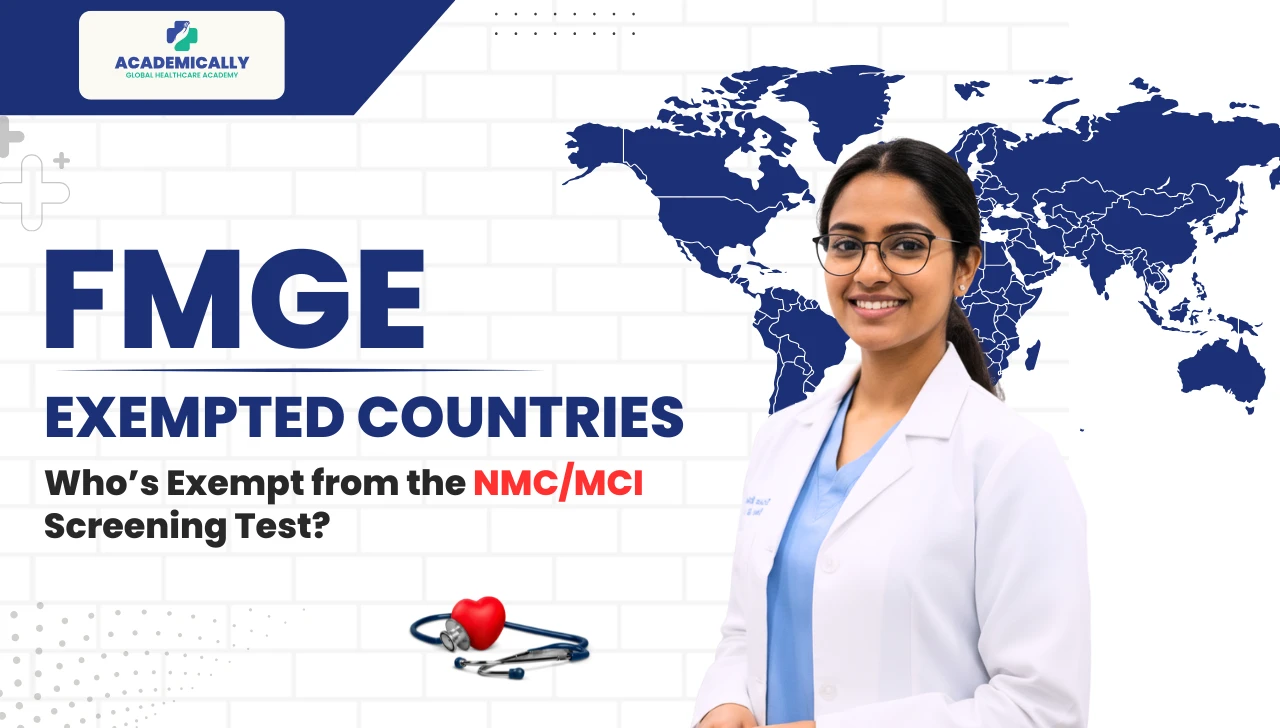Did you know that over 20,000 foreign medical graduates apply to practice in India every year? If you’re an Indian citizen who earned your medical degree from a foreign university, you’ve likely heard of the FMGE. This examination determines whether you’re eligible to practice medicine in India. It’s your gateway to becoming a registered medical professional in the country.
However, there are a few countries that are exempt from this exam. This means they can practice in India without having to clear the exam. Wondering which of these countries are? This blog will explore the countries as well as what it means for the IMGs.
Let's get started.
What is FMGE?
FMGE stands for Foreign Medical Graduate Examination. It is popularly known as the NMC/MCI Screening Test conducted by the National Board of Examinations in Medical Sciences. It is for Indian citizens and OCI holders who have obtained their medical degree outside India. The exam is mandatory if you wish to practice medicine in India. After passing the exam, you can register with the National Medical Commission (NMC) or State Medical Councils (SMCs). The FMGE serves an important role in standardizing medical practice in India.
It has become even more important with the increasing number of students going abroad for medical education.
Who Needs to Take the FMGE Exam?
Wondering whether you need to take the FMGE? Here's a simple checklist:
- Required for Indian citizens or OCI holders with a foreign medical degree
- Completed primary medical qualifications outside India
- Those with degrees from non-NMC-recognized institutions
You need to take the FMGE if you fall into any of the above categories.
FMGE Exempt Countries
There are a few countries whose registered medical practitioners are exempt from the FMGE:
- USA
- UK
- Australia
- Canada
- New Zealand
Reading Between the Lines
The exemption isn’t automatic or unconditional for all graduates from these countries. Some of the bona fide conditions include:
- The primary medical qualification must be from one of the exempt countries.
- In some sources, the candidate may also need to possess a post-graduate medical qualification from that country and have enrolment/recognition as a medical practitioner there.
- The medical school and qualification must be recognized, and meet India’s regulatory equivalence requirements for registration.
So a candidate might qualify for exemption if they did MBBS (or equivalent) and PG in one of the five countries, under recognised standards.
Why These Exemptions Exist
Why did Indian medical regulators carve out an exception for these five countries? A few reasons:
1. Quality Alignment and Mutual Recognition
These countries’ medical education systems (USA, UK, Canada, Australia, New Zealand) are widely understood to have rigorous standards of training, clinical exposure, oversight, licensing, and accreditation. Indian regulators have judged that a graduate from those systems meets “practice-ready” standards without additional screening.
2. Ease of Registration
Exempting certain countries helps ease the registration of doctors qualified in high-standard systems, facilitating their practice in India. It also reflects a recognition that different medical systems may be equivalent if they satisfy the regulatory benchmarks set by India.
3. Regulatory Pragmatism
Given the large number of foreign medical graduates returning to India and the administrative burden of screening, selective exemptions help streamline the process for those with very strong credentials, allowing resources to focus where alignment is less clear.
What This Means In Practice
For a candidate who did their medical degree in one of the exempt countries and satisfies the associated conditions:
- They can apply directly for registration with the State Medical Council or NMC in India without sitting the FMGE.
- They save the time, effort and stress of preparing and taking the FMGE exam.
- They move more quickly into practice or employment in India.
For others, the FMGE is not optional. They must pass it to obtain registration.
A Cautionary Note
- Exemption doesn’t mean there are no regulatory checks. Candidates must still meet other conditions like recognition of the degree, verification, internship etc.
- The regulatory landscape is evolving. For example, the NMC is introducing the National Exit Test “NEXT” for both Indian and foreign medical graduates. This may change how exemptions or screening work.
- Always check the latest official guidelines from NMC / State Medical Council. Rules may change, and exemptions may get stricter or more specific.
In Summary
If you hold a medical qualification from one of the five countries
- USA
- UK
- Canada
- Australia
- New Zealand
And meet the additional criteria, such as:
- PG qualification
- Recognition in that country
- Proper accreditation
- License to practice
You may skip the FMGE and directly register in India. If you studied in any other country, the FMGE remains your gateway to medical practice in India. The exemption exists because Indian regulators trust the training systems of those countries and have chosen to recognise them as equivalent without the extra screening.
And if you are a medical graduate who is planning to start the practice in India, and wondering if you need to take the FMGE or not, reach out to us. Explore your options as a foreign medical graduate in India and abroad.





